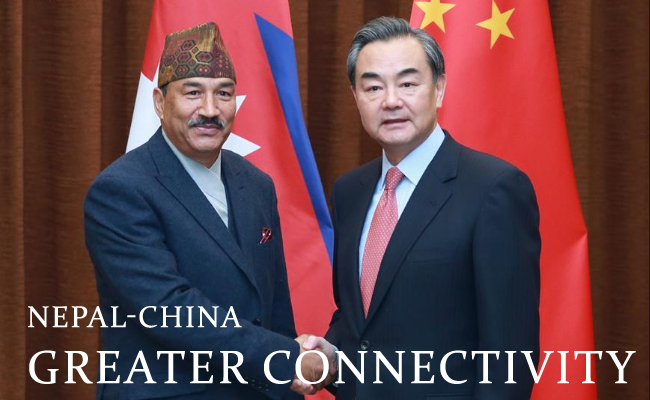Naturally a nation’s foreign policy is ever guided by the idea of preservation of its core national interests and in order to enhance and expand the bilateral friendship, suitable changes must be effected so that the ties meet the needs of the changing times and the world politics.
So says the RPP-Nepal, Chairman Kamal Thapa while presentation a paper at a seminar on Nepal-China ties organized by the Madan Bhandari Memorial Foundation in Kathmandu, June 11, 2018.
Timely changes must be effected in the bilateral ties or else the friendship remains static which is not diplomatically affordable to the contracting parties on either side because it doesn’t meet the demand as per the ever changing needs of the world politics.
“It was in this light that we were thinking to provide a new dimension to the existing Nepal-China ties and as the luck would have it, Nepal luckily have had an energetic and capable Prime Minister KP Oli during the time of the great economic blockade imposed by India on Nepal and thus we were left with no option other than to approach China which was by then already become a world power”, added Kamala Thapa who was in 2015, the country’s Foreign Minister and had travelled to Beijing to seek assistance so that Nepal’s problems created by the Indian blockade could be minimized through the support from the China, if made available.
China did help Nepal and sent some essential commodities to ease the problems being faced by the Nepali population due to the Indian blockade.
The Himalayan ranges in the North adjoining China’s Tibet were formerly taken as barriers for the expansion of Nepal-China bilateral relations which now no longer remains the same”, continued Kamal Thapa adding that “since Nepal’s geopolitics is a sensitive one and thus such a situation could be taken both as an opportunity and a challenge as well.
“During my 2015 visit to Beijing, I had the honor to brief the Chinese authorities about the issues and problems confronting Nepal due to the Indian imposed economic blockade and fortunately we both have had agreed on eight different subjects”, said a beaming Kamal Thapa at the said seminar held in Kathmandu.
However, the KP Oli government collapsed then and the talks that Nepal had with China too got stalled for some two good years, Kamal Thapa continued.
Lamenting on the Nepalese standard habit, Kamal Thapa bluntly says that we seldom think that we too have a “reliable” friend in the North ready to extend its support to Nepal. Unfortunately, as and when we have transit problems, we look always only towards India and forget to think of China.
We have been committing blunder, admitted Kamal Thapa while presenting his version on Nepal-China relations.
Mr. Thapa made a grand revelation indeed. According to Thapa, President Xi Jinping had expressed his fervent desire to give a new height to Nepal-China relations at time of the visit of President Dr.
Ram Baran Yadav itself, however, things did not go as China had desired.
“We have more than twelve opening in between us that has the potential to link Nepal with adjoining Tibet Autonomous Region”, revealed Thapa.
Thapa was of the opinion that Prime Minister KP Oli during this time of his Beijing visit should ask for greater connectivity with China so that even if there was another blockade from India of the sort of the 2015 or any other natural disaster befall on Nepal, we could continue our two way business with China and minimize the dependence on the Indian side.
Brilliant suggestion indeed.
In all, Thapa hinted that now it all depended on PM KP Oli as to how he presents himself in Beijing and brings in his diplomatic acumen into action so that the highest authorities in Beijing considering Nepali constraints pleasingly extend the helps that Nepal aspires from a benevolent neighbor in the North.
“We should now erase from our minds that we are India locked country and concurrently think that we have concurrently a reliable friend in the North”, said Thapa winding up his paper on Nepal-China ties.
Interestingly, Kamal Thapa is very close to Indian PM Narendra Modi.

